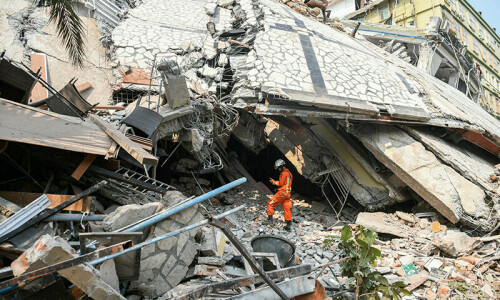Recent unrest in Iran has highlighted the deep-seated frustration felt by many Iranians over the economy and their demands for reform, and attention now turns to how the political establishment will respond.
Often seen in monolithic terms outside the country, Iran's politicians are vetted by a conservative-dominated Guardian Council to ensure they are loyal to the Islamic revolution, and ultimate power rests with supreme leader Ayatollah Ali Khamenei.
But there are still deep divisions over how the country should move forward politically, socially and economically.
While all groups opposed the recent unrest and accepted action was needed to address economic problems, five key factions are pulling in different directions on how best to reform the country.
Moderates of President Hassan Rouhani
The moderate faction currently dominates Iranian politics, focusing on better management of the economy, rebuilding trade with the West and gradually improving civil liberties as the best way to preserve the Islamic revolution.
Rouhani has been accused of pushing austerity and neo-liberal economic policies at the expense of the poor. He has called for more time for the benefits to trickle down and remains popular with many middle class voters for his efforts to challenge unaccountable parts of the establishment.
Like his mentor, the arch-pragmatist Akbar Hashemi Rafsanjani who died in January 2017, he has shown his capacity to switch direction and has accepted that more needs to be done to protect poorer sections of society. Analysts say the protests could provide him with an opportunity to push for more radical reforms.
Reformists of ex-president Mohammad Khatami
Despite being barred from public appearances over his role in 2009 protests, Khatami remains one of the most popular figures in Iranian politics.
His endorsement was seen as crucial to Rouhani's election in 2013 and 2017.
The reformist faction includes some 20 parties pushing for greater freedoms, gender equality and worker rights. Most of their legislation was blocked by the Guardian Council during Khatami's 1997-2005 tenure, and they were decimated by the crackdown on pro-reformist demonstrations in 2009.
However, their alliance with the moderates has seen reformists return to the corridors of power, and they hold influential positions in Rouhani's cabinet.
Conservatives and hardliners
A broad range of conservative parties strongly oppose efforts to liberalise society and remain deeply suspicious of rapprochement with the West. They are pushing hard for a more self-subsistent “resistance economy” as directed by Khamenei.
Having been hurt by divisions in recent elections, they succeeded in rallying behind a single candidate in May's election — hardline cleric Ebrahim Raisi, who took almost 16 million votes to Rouhani's 24 million.
They have gained considerable traction by criticising Rouhani's economic reforms and the failure to support the poor, particularly cuts to welfare and subsidies, and the unrest could bolster their position.
However, reformists accuse them of threatening the regime as a whole by encouraging the initial protests against Rouhani.
Moderate conservatives of Ali Larijani
Parliament speaker Larijani and his allies control the main parliamentary commissions and will be crucial to the passage of eventual reforms.
They have largely supported Rouhani's economic reforms and the nuclear deal with world powers.
However, the faction is less favourable to Rouhani's efforts to liberalise society and opposes the president's criticisms of other parts of the establishment. Larijani has also been a strong advocate of the “resistance economy”.
Ex-president Mahmoud Ahmadinejad
Ahmadinejad remains widely popular, particularly among poorer segments of society who recall his large-scale welfare schemes.
However, he has been increasingly ostracised by the political establishment. He was barred from running in last year's election and his protege Hamid Baghaie was last month sentenced to 15 years in prison for corruption.
















































